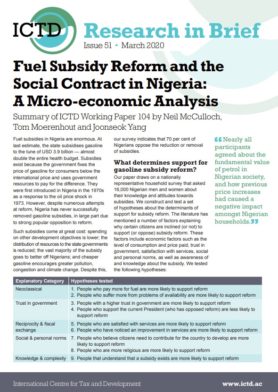Research in Brief 51
Fuel subsidies in Nigeria are enormous. At last estimate, the state subsidises gasoline to the tune of USD 3.9 billion — almost double the entire health budget. Subsidies exist because the government fixes the price of gasoline for consumers below the international price and uses government resources to pay for the difference. They were first introduced in Nigeria in the 1970s as a response to the oil price shock in 1973. However, despite numerous attempts at reform, Nigeria has never successfully removed gasoline subsidies, in large part due to strong popular opposition to reform. Such subsidies come at great cost: spending on other development objectives is lower; the distribution of resources to the state governments is reduced; the vast majority of the subsidy goes to better off Nigerians; and cheaper gasoline encourages greater pollution, congestion and climate change. Despite this, our survey indicates that 70 per cent of Nigerians oppose the reduction or removal of subsidies. This is a 2-page summary of ICTD Working Paper 104 by Neil McCulloch,Tom Moerenhout and Joonseok Yang.

